- Home
- Roger Zelazny
Creatures of Light and Darkness Page 4
Creatures of Light and Darkness Read online
Page 4
“It is the magician,” someone says, “from the show across the river.”
“Correct,” he replies, with a nod and a smile, and he makes his way forward through the crowd, clearing his path with a silver-topped cane. The lid is closed on the casket as he pauses and whispers, “Madrak the Mighty.”
Madrak turns and says, “I’ve been looking for you.”
“I know. That’s why I’m here. What is this silly business?”
“Suicide show,” says Madrak. “A man named Dolmin. They’ve forgotten what death is like.”
“So soon, so soon,” sighs the other. “Then let us give them their money’s worth—full circle!”
“Vramin, I know you can do it, but considering the shape he’s in—”
The small man in the straw hat approaches and regards them with his small, dark eyes.
“Sir,” he says to Madrak, “any other ceremonial things you’d care to do before the interment?”
“Of course not,” says Vramin. “One only buries the dead.”
“What do you mean?”
“That man is not dead—only smoldering.”
“You’re wrong, mister. This is an honest show.”
“Nevertheless, I say he lives and will walk again for your amusement.”
“You must be some kind of ’chotic.”
“Only an humble thaumaturge,” Vramin replies, stepping into the circle.
Madrak follows him. Vramin then raises his cane and weaves it through a cryptic gesture. It glows with green light, which then leaps forward and falls upon the box.
“Dolmin, come forth!” says Vramin.
The audience presses forward. Vramin and Madrak move to the wall of the tent, The small man would follow them, but is distracted by a knocking from within the coffin.
“Brother, we`d best leave,” says Vramin, and slices through the fabric with the tip of his cane.
The lid of the coffin is slowly raised as they step through the wall and into the world without.
Beyond them a sound occurs. It is compounded of screaming and cries of “Fake!” and “We want our money back!” and “Look at him!”
“‘What fools these mortals be,’” says the green man, who is one of the few persons living able to put quotation marks around it and know why.
He is coming, riding down the sky on the back of a great beast of burnished metal. It has eight legs and its hooves are diamonds. Its body is as long as two horses. Its neck is as long as its body, and its head is that of a Chinese demon dog out of gold. Beams of blue light come forth from its nostrils and its tail is three antennae. It moves across the blackness that lies between the stars, and its mechanical legs move slowly. Each step that it takes, however, crossing from nothing to nothing, carries it twice the distance of the previous step. Each stride also takes the same amount of time as the prior one. Suns flash by, fall behind, wink out. It runs through solid matter, passes through infernos, pierces nebulae, faster and faster moving through the starfall blizzard in the forest of the night. Given a sufficient warm·up run, it is said that it could circumnavigate the universe in a single stride. What would happen if it kept running after that, no one knows.
Its rider was once a man. He is the one who is called the Steel General. That is not a suit of armor that he is wearing; it is his body. He has turned off most of his humanity for the duration of the trip, and he stares now straight ahead past the scales like bronze oak leaves on the side of his mount’s neck. He holds four reins, each as thick as a strand of silk, on the fingertips of his left hand. He wears a ring of tanned human flesh on his little finger, because it would be senseless and noisy for him to wear metal jewelry. The flesh was once his; at least, it helped to surround him at one time long ago.
Wherever his goes, he carries a collapsible five-string banjo with him in a compartment near to where his heart used to be. When he plays it he becomes a kind of negative Orpheus and men follow him to Hell.
He is also one of the very few masters of temporal fugue in the entire universe. It is said that no man can lay hands upon him unless he permits it.
His mount was once a horse.
Regard the world of Blis, with its color and its laughter and its breezes. Regard the world of Blis as Megra of Kalgan.
Megra is a nurse in Kalgan Obstetrical Center 73, and she knows that the world is babies. Blis has something like ten billion people breathing at one another, with more occurring constantly and very few departing. The impaired are repaired. There is no infant mortality. Screams of the newborn and the laughter of their makers are the two most often heard sounds on Blis.
Megra of Kalgan regards Bliss through cobalt-colored eyes amidst long blonde lashes. The fine strands of her pale hair tickle her naked shoulders, and two stiffened spears of it cross to form an X in the center of her brow. Her nose is small, her mouth is a tiny blue flower, and she has very little chin to speak of. She wears a silver breast strap, a golden belt and a short silver skirt. She is barely tive feet in height, and she has been touched with the odor of flowers she has never seen. She wears a golden pendant which grows warm upon her breast whenever men place aphrodisiacs before her.
Megra waited ninety-three days before she could gain entrance to the Fair. The waiting Iist was long, because of the fact that the fairground that is all colors and odors and movements is one of the very few such open places remaining upon Blis. There are only fourteen cities on Blis, but they cover the four continents from sea to creamy sea, burrow far beneath the land and tower into the sky. Portions of them also extend beneath the seas. Actually, all of them interlock with several others, making for continental layers of civilization; but since there are
fourteen separate city governments with clear territorial jurisdictions, there are said to be fourteen cities on Blis. Megra’s city is Kalgan, where she tends life that is screaming and new, and occasionally life that is screaming and old, in all colors, all shapes. Since a gene pattern can be constructed to satisfy the parents’ specific wishes and substituted surgically for the nucleus of a fertilized cell, she is liable to see anything born and often does. Being old-fashioned, all that Megra’s own parents had wanted was a cobalt-eyed doll with the strength of a dozen or so men, so that the kid could take care of herself in life.
However, after having taken care of herself successfully for eighteen years, Megra decided that the time had come to contribute to the general breathing. It takes two to strive for infinity, and Megra decided upon the colors and the romance of the open places, of the fairground, for her striving. Life is her occupation and her religion, and she is anxious to serve it further. A month’s vacation lies before her.
All she has to do now is find the other one…
The Thing That Cries ln The Night raises its voice within its barless prison. It howls, coughs and barks, gibbers, wails. It is contained within a silver cocoon of fluctuating energies, suspended from an invisible web of forces and hung within a place which has never known daylight.
The Prince Who Was A Thousand tickles it with laser beams, bathes it with gamma rays and feeds it a varying range of ultrasonics and subsonics.
Then it is silent, and for a bare moment the Prince raises his head from the equipment he has brought, and his green eyes widen and the corners of his thin lips twitch upwards after a smile they never reach.
It begins to scream again.
He gnashes his milk-white teeth and throws back his dark cowl.
His hair is a halo of fallow gold in the twilight of the Place Without Doors. He stares upward at the almost-seen form that writhes within the light. As often he has cursed it, his lips move mechanically around the words they always form when he fails.
For ten centuries he has tried to kill it, and still it lives.
He crosses his arms upon his breast, bows his head and vanishes.
A dark thing cries out within the light, within the night.
Madrak tilts the beaker, refills their glasses.
Vramin raises his, s
tares out across the wide esplanade before his pavilion, quaffs it.
Madrak pours once more.
“lt is neither life, nor is it fair,” says Vramin, finally.
“Yet you never actively supported the program.”
“What matters that? It is my present feelings that control me.”
“The feelings of a poet…”
Vramin strokes his beard.
“I can never give full allegiance to anything or to anyone,” he replies.
“Pity, poor Angel of the Seventh Station.”
“That title perished with the Station.”
“In exile, the aristocracy always tends to preserve small items pertaining to rank.”
“Face yourself in the darkness and what do you see?”
“Nothing.”
“Exactly.”
“What is the connection?”
“Darkness.”
“I fail to see.”
“That, warrior-priest, is common in the dark.”
“Cease the riddling, Vramin. What is the matter?”
“Why did you seek me, here at the Fair?”
“I have the latest population figures with me. They strike me as approximating the mythical Point Critical—that which never occurs. Would you care to see them?”
“No. I do not need to. Whatever the figures, your conclusion is correct.”
“You feel it with your special perceptions, within the tides of the Power?”
Vramin nods.
“Give me a cigarette,” says Madrak.
Vramin gestures, and a lighted cigarette appears between his fingers.
“It is special this time,” he says. “It is not just a waning of the tide of Life. There will be a rip tide, I fear.”
“How will this be manifest?”
“I do not know, Madrak, But I do not intend to stay here longer than is necessary to find out.”
“Oh? When will you depart?”
“Tomorrow evening, though I know I am flirting with the Black Tide once more. I had best do something about my death wish again, sometime soon, preferably in pentameter.”
“Do any others remain?”
“No, we are the only two immortals on Blis.”
“Will you give me a gateway when you go?”
“Of course.”
“Then I’ll remain here at the Fair until tomorrow evening.”
“I should strongly recommend your going immediately, rather than waiting. I can provide a gateway now.” Vramin gestures again and draws upon a cigarette of his own. He notices his refilled glass and sips it. “It would be an act of wisdom to depart immediately,” he decides, “but wisdom is itself the product of knowledge; and knowledge, unfortunately, is generally the product of foolish doings. So, to add to my own knowledge and to enhance my wisdom I shall remain another day, to see what occurs.”
“Then you expect that something special will happen tomorrow?”
“Yes. The rip tide. I feel the coming of Powers. There was recently some movement in that great House where all things go.”
“Then this is knowledge which I, too, wish to obtain,” says Madrak, “as it affects my former master Who Was A Thousand.”
“You cling to an outworn loyalty, mighty one.”
“Perhaps. And what is your excuse? Why do you seek to enhance your wisdom at this expense?”
“Wisdom is an end in itself. Also, these doings may be sources of great poetry.”
“If death be the source of great poetry, then I prefer the lesser variety. I feel, though, that the Prince should know of any new development within the Middle Worlds.”
“I drink to your loyalty, old friend, though I feel our former liege to be at least partly responsible for the present muddle.”
“Your feelings on this matter are not unknown to me.”
The poet takes one sip and lowers his glass. His eyes then grow all of one color, that being green. The white which encircles them vanishes, and the black points are gone that had been their centers. They are now become pale emeralds, and a yellow spark lives within each.
“Speaking in my capacity as mage and seer,” he says, in a voice grown distant and toneless, “l say that it has now arrived upon Blis, this thing that portends the chaos. I say, too, that another comes, for I hear soundless hoofbeats within the dark, and I see that which is invisible in its many-strided pacings over stars. We may yet ourselves be drawn into this thing, who have no wish to participate.”
“Where? And how?”
“Here. And it is not life, nor is it fair.”
Madrak nods his head and says, “Amen.”
The magician gnashes his teeth. “It is our destiny to bear witness,” he decides, and his eyes burn with an infernal brilliance and his knuckles whiten upon the black walking stick with its head of silver.
…An eunuch priest ofthe highest caste sets tapers before a pair of old shoes.
…The dog worries the dirty glove which has seen many better centuries.
…The blind Norns strike a tiny silver anvil with fingers that are mallets. Upon the metal lies a length of blue light. The mirror comes alive with images of nothing that stands before it.
It hangs in a room which has never held furniture, hangs upon a wall covered with dark tapestries, hangs before the witch who is red, and her flames.
Looking into it is like looking through a window into a room filled with pink cobwebs which are stirred by sudden gusts of air.
Her familiar stands upon her right shoulder, its hairless tail hung about her neck, between her breasts. She strokes its head and it wags its tail.
She smiles, and the cobwebs slowly blow away. The flames leap about her, but nothing is burning.
Then the cobwebs are gone and she regards the colors of Blis.
Most particularly, though, she regards the tall man who stands naked to the waist in the midst of a thirty-five-foot circle surrounded by people.
His shoulders are wide, and his waist is quite narrow. He is barefooted, and he wears tight black trousers. He stares downward. His hair is sand-colored; his arms are enormously well muscled; his skin is rather pale. About his waist goes a wide, dark belt with a vicious row of studs set upon it. He stares downward through yellow eyes at the man who is attempting to raise himself from where he lies upon the ground.
The man at his feet is heavy about the shoulders, chest, stomach. He raises himself with one arm. His beard brushes his shoulder as he throws back his head and glares upward. His lips move, but his teeth are clenched.
The standing man moves one foot, almost casually, sweeping away the supporting arm. The other falls upon his face and does not move.
After a time, two men enter the circle and bear away the man who has fallen.
“Who?” pipes the familiar.
The Red Witch shakes her head, however, and continues to watch.
A four-armed man enters the circle, and his feet are great, splayed things, like another pair of enormous hands at the bottoms of his twisted legs. He is hairless and shining, and as he draws near to the standing man, he drops so that his lower arms come to rest upon the ground. As he does so, his knees turn outward to the sides and he bends backward, so that his head and his shoulders are still perpendicular to the ground, though now at a height of approximately three feet above it.
Springing froglike, he does not encounter his target, but meets instead with a flat hand upon the back of his neck and another beneath his stomach. Each hand describes a semicircle, and he passes, head over hands over hands over heels. But he crouches where he falls, his sides heave three times and he leaps once more,
This time the tall man catches his ankles and holds him upside down at arm’s length from his body.
But the four-armed man twists and seizes the wrists which hold him, driving his head into the other’s stomach. There is blood upon his scalp then, for he has struck one of the belt studs, but the tall man does not release him. He pivots upon his heel and swings him outward. Then he turns
again and again, until he moves like a top, spinning. After a full minute he slows, and the four-armed man’s eyes are closed. Then he lowers him to the ground, falls upon him, moves his hands quickly, rises. The four-armed man lies still. After a time, he, too, is taken away.
Three more then fall before him, including Blackthorn Villy, Fourcity Champion of Blis, with his mechanical pincers, and the man is taken up upon shoulders and garlanded, and they bear him to a platform and honor him with the cup of victory and the draft of money. He does not smile until his eyes fall upon Megra of Kalgan, standing there, whose blonde X marks the spot his glances go to till he is free to follow them with boots upon his feet.
She waits for this.
The Red Witch watches the lips of the multitudes.
“Wakim,” she finally says. “They call him Wakim.”
“Why is it that we watch him?”
“I had a dream which I have read to indicate this: Watch the place of the changing tide. Even here, beyond the Middle Worlds, the mind of a witch is tied to the tides of the Power. Though I cannot use them now, still do I perceive them.”
“Why this one—this Wakim—at the place of the changing tide?”
“The quality of the mirror is mute omniscience. It shows anything, explains nothing. But it took its direction from my dream, so it remains for me to interpret this thing through meditation.”
“He is strong, and very fast.”
“True, I have not seen his like since sun-eyed Set fell before the Hammer That Smashes Suns, in his battle with the Nameless. Wakim is more than he appears to that crowd, or to the little girl toward whom he moves. See, as I cause the mirror to brighten and brighten! There is a dark aura about him that I do not like. He is something of the reason my sleep was troubled. We must see that he is followed. We must learn what he is.”
“He will take the girl over the hill,” says her familiar, poking its cold nose into her ear. “Oh, let us watch!”
“Very well,” she says, and it wags its tail and clasps its forepaws atop its curly head.
The man stands in a place that is circled round about with a pink hedge and filled with flowers of all colors. It contains benches, couches, chairs, a table and high trellises of roses, all beneath a great green umbrella tree that shuts out the sky. lt is filled with perfumes and the essences of flowers, and there is music that hangs awhile upon the air and passes slowly through it. Pale lights move within the branches of the tree. A tiny, intoxicating fountain sparkles beside the table at the foot of the tree.

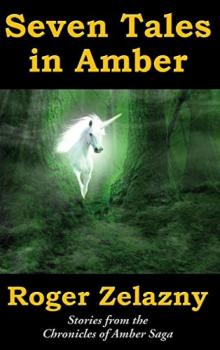 Seven Tales in Amber
Seven Tales in Amber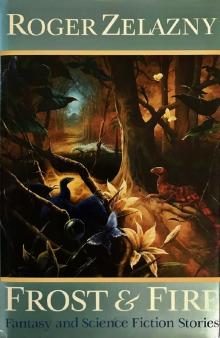 Frost and Fire
Frost and Fire Doorways in the Sand
Doorways in the Sand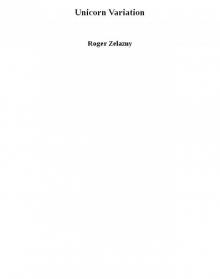 Unicorn Variation
Unicorn Variation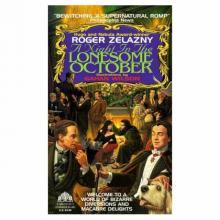 A Night in the Lonesome October
A Night in the Lonesome October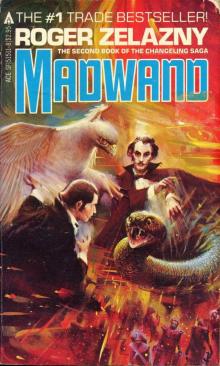 Madwand
Madwand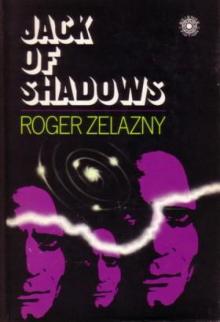 Jack Of Shadows
Jack Of Shadows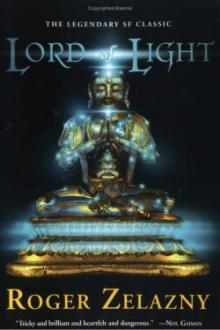 Lord of Light
Lord of Light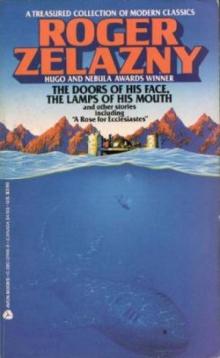 The Doors of His Face, The Lamps of His Mouth and Other Stories
The Doors of His Face, The Lamps of His Mouth and Other Stories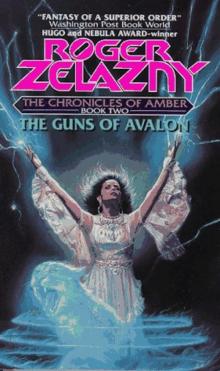 Guns Of Avalon tcoa-2
Guns Of Avalon tcoa-2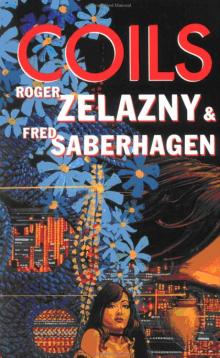 Coils
Coils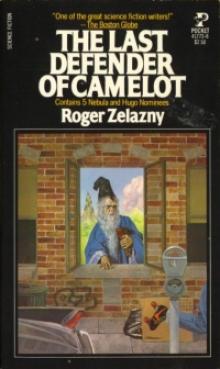 The Last Defender Of Camelot
The Last Defender Of Camelot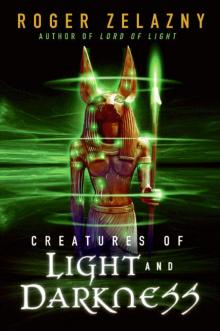 Creatures of Light and Darkness
Creatures of Light and Darkness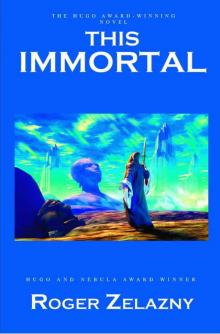 This Immortal
This Immortal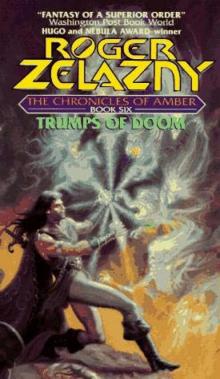 Trumps of doom tcoa-6
Trumps of doom tcoa-6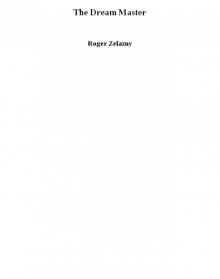 The Dream Master
The Dream Master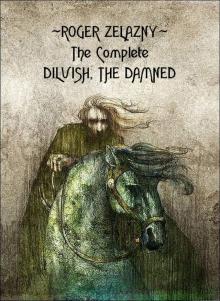 The Complete Dilvish, The Damned
The Complete Dilvish, The Damned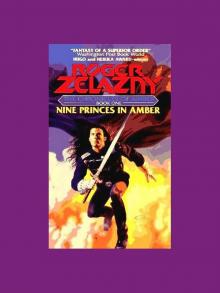 Nine Princes in Amber
Nine Princes in Amber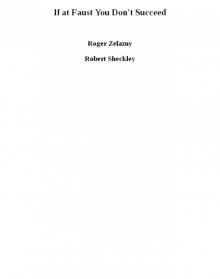 If at Faust You Don't Succeed
If at Faust You Don't Succeed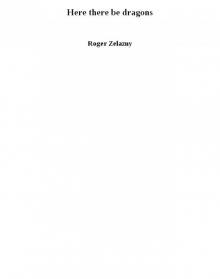 Here there be dragons
Here there be dragons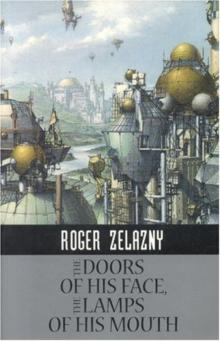 The Doors Of His Face, The Lamps Of His Mouth
The Doors Of His Face, The Lamps Of His Mouth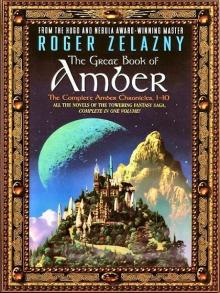 The Great Book of Amber - Chronicles 1-10
The Great Book of Amber - Chronicles 1-10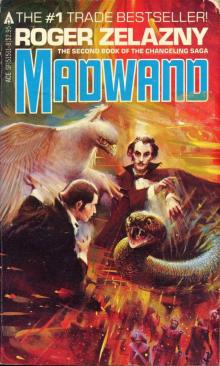 Madwand (Illustrated)
Madwand (Illustrated)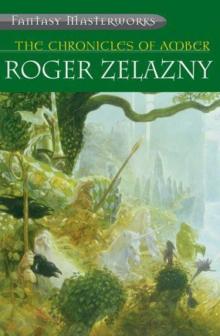 The Chronicles of Amber
The Chronicles of Amber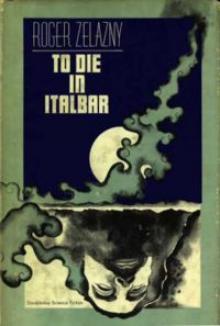 To Die In Italbar
To Die In Italbar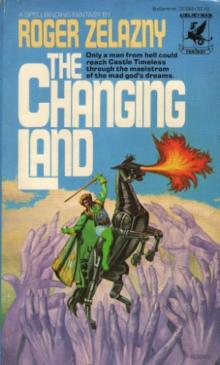 The Changing Land
The Changing Land The Furies
The Furies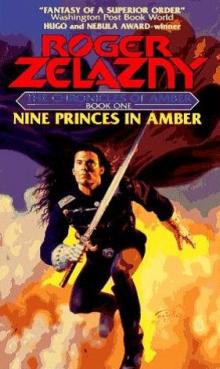 Nine Princes In Amber tcoa-1
Nine Princes In Amber tcoa-1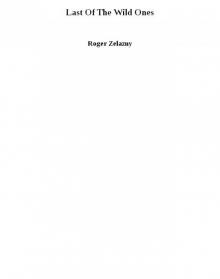 Last Of The Wild Ones
Last Of The Wild Ones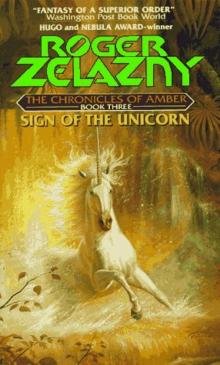 Sign of the Unicorn tcoa-3
Sign of the Unicorn tcoa-3 My Name is Legion
My Name is Legion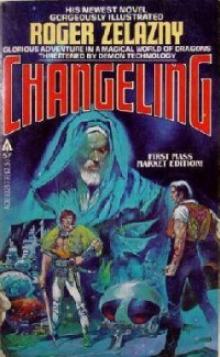 Wizard World 1: Changeling
Wizard World 1: Changeling Changeling
Changeling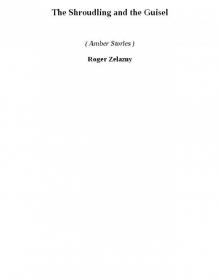 The Shroudling and the Guisel (amber stories)
The Shroudling and the Guisel (amber stories)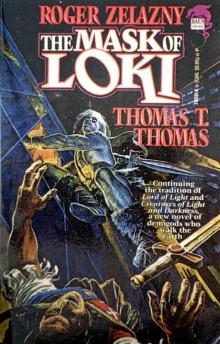 The Mask of Loki
The Mask of Loki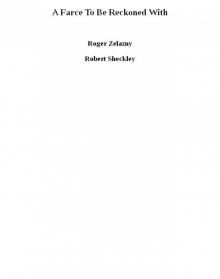 A Farce To Be Reckoned With
A Farce To Be Reckoned With Roadmarks
Roadmarks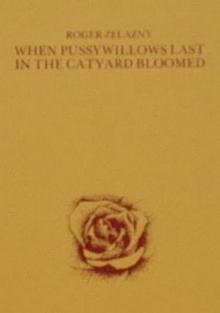 When Pussywillows Last in the Catyard Bloomed (rtf)
When Pussywillows Last in the Catyard Bloomed (rtf)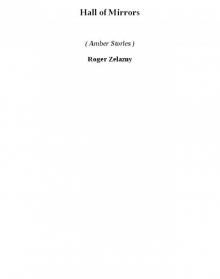 Hall of Mirrors (amber stories)
Hall of Mirrors (amber stories)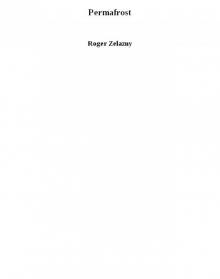 Permafrost
Permafrost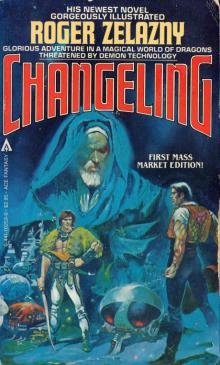 Changeling (Illustrated)
Changeling (Illustrated)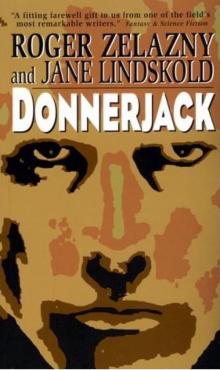 Donnerjack
Donnerjack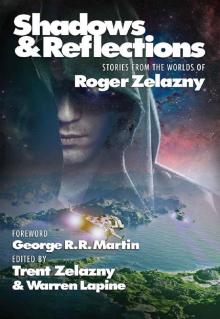 Shadows & Reflections: A Roger Zelazny Tribute Anthology
Shadows & Reflections: A Roger Zelazny Tribute Anthology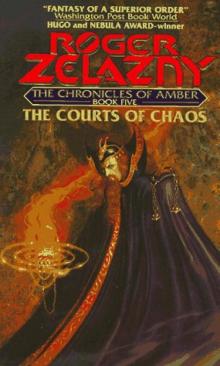 The Courts Of Chaos tcoa-5
The Courts Of Chaos tcoa-5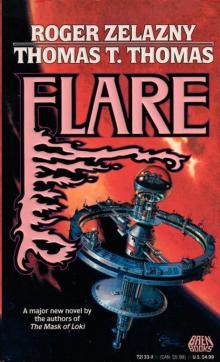 Flare
Flare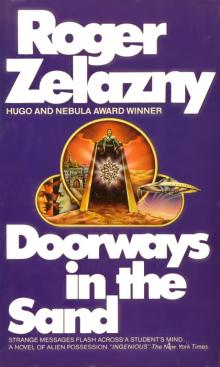 Doorsways in the Sand
Doorsways in the Sand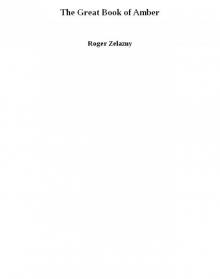 The Great Book of Amber
The Great Book of Amber Home Is the Hangman
Home Is the Hangman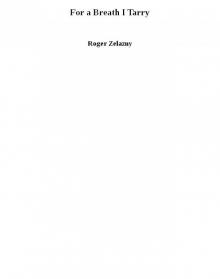 For a Breath I Tarry
For a Breath I Tarry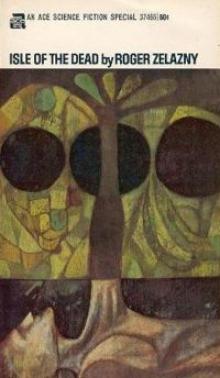 Isle Of The Dead
Isle Of The Dead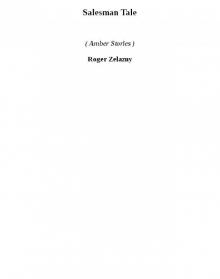 Salesman Tale (amber stories)
Salesman Tale (amber stories)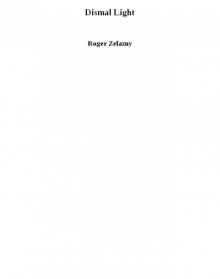 Dismal Light
Dismal Light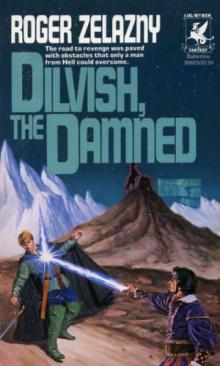 Dilvish, The Damned
Dilvish, The Damned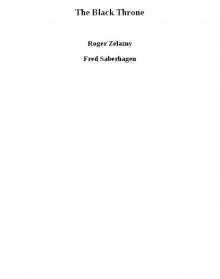 The Black Throne
The Black Throne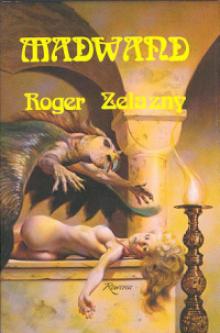 Wizard World 2: Madwand
Wizard World 2: Madwand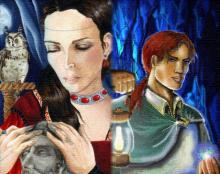 The Salesman's Tale
The Salesman's Tale